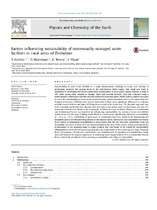| dc.contributor.author | Kativhu, T. | |
| dc.contributor.author | Mazvimavi, D. | |
| dc.contributor.author | Tevera, D. | |
| dc.date.accessioned | 2021-08-02T09:45:40Z | |
| dc.date.available | 2021-08-02T09:45:40Z | |
| dc.date.issued | 2017 | |
| dc.identifier.citation | Kativhu, T. et al. (2017). Factors influencing sustainability of communally-managed water facilities in rural areas of Zimbabwe. Physics and Chemistry of the Earth, 100, 247–257. https://doi.org/10.1016/j.pce.2017.04.009 | en_US |
| dc.identifier.issn | 1474-7065 | |
| dc.identifier.uri | https://doi.org/10.1016/j.pce.2017.04.009 | |
| dc.identifier.uri | http://hdl.handle.net/10566/6477 | |
| dc.description.abstract | Sustainability of point water facilities is a major development challenge in many rural settings ofdeveloping countries not sparing those in the Sub-Saharan Africa region. This study was done inZimbabwe to investigate the factors influencing sustainability of rural water supply systems. A total of399 water points were studied in Nyanga, Chivi and Gwanda districts. Data was collected using aquestionnaire, observation checklist and key informant interview guide. Multi-Criteria analysis was usedto assess the sustainability of water points and inferential statistical analysis such as Chi square tests andAnalysis of Variance (ANOVA) were used to determine if there were significant differences on selectedvariables across districts and types of lifting devices used in the study area. The thematic approach wasused to analyze qualitative data. Results show that most water points were not functional and only 17%across the districts were found to be sustainable. A fusion of social, technical,financial, environmentaland institutional factors was found to be influencing sustainability. On technical factors the ANOVAresults show that the type of lifting devicefitted at a water point significantly influences sustainability(F¼37.4, p<0.01). Availability of spare parts at community level was found to be determining thedowntime period of different lifting devices in the studied wards. Absence of user committees was foundto be central in influencing sustainability as water points that did not have user committees were notsustainable and most of them were not functional during the time of the survey. | en_US |
| dc.language.iso | en | en_US |
| dc.publisher | Elsevier | en_US |
| dc.subject | Sustainability factors | en_US |
| dc.subject | Rural water facilities | en_US |
| dc.subject | Zimbabwe | en_US |
| dc.subject | Developing countries | en_US |
| dc.subject | Water supply systems | en_US |
| dc.title | Factors influencing sustainability of communally-managed waterfacilities in rural areas of Zimbabwe | en_US |
| dc.type | Article | en_US |

